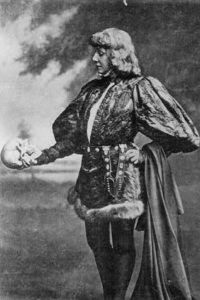I tried to explain why that is. It’s more than just “I liked that movie, I would watch it again.” With Shakespeare’s masterpieces you get this dual-nature thing going where on the one hand you’ve got what Shakespeare wrote us 400 years ago. That’s not changing. You could see Hamlets now till the end of time and the source text isn’t going anywhere. But on the other hand you’ve got this particular interpretation. It is one of a million. So, sure, Hamlet always says “To be or not to be”, but how did this particular actor say it? And why? How does it differ from how that other actor said it?
I was at a loss to explain the analogy. I started down the path of saying “Imagine you have a chance, regularly, to go see the Mona Lisa. But that’s not quite it, because that’s a masterpiece that doesn’t change, it’s the same every time you see it. What if every time you saw it, it was different? Still the same, still the Mona Lisa, still a masterpiece. But … different.”
Does anybody know what I’m trying to say? Many a science fiction story has been written about all powerful core sources of “stuff”, be it energy or life or power or what have you, and the notion of seeds or splinters of that wellspring being used as the essence of new “stuff”. It’s a bit like that. Here you’ve got this body of work that’s essentially infinite in that we can continue to draw on it forever. So each time we perform it we’re taking a little sliver of it and creating something new.
Make sense? Am I babbling?

 You know what just occurred to me? I don’t recall seeing a single peanut in any of Shakespeare’s works. Perhaps Shakespeare was suggesting that Hamlet was allergic? More importantly could he have found a rhyme for “epi pen” while still getting the meter to come out right?
You know what just occurred to me? I don’t recall seeing a single peanut in any of Shakespeare’s works. Perhaps Shakespeare was suggesting that Hamlet was allergic? More importantly could he have found a rhyme for “epi pen” while still getting the meter to come out right?